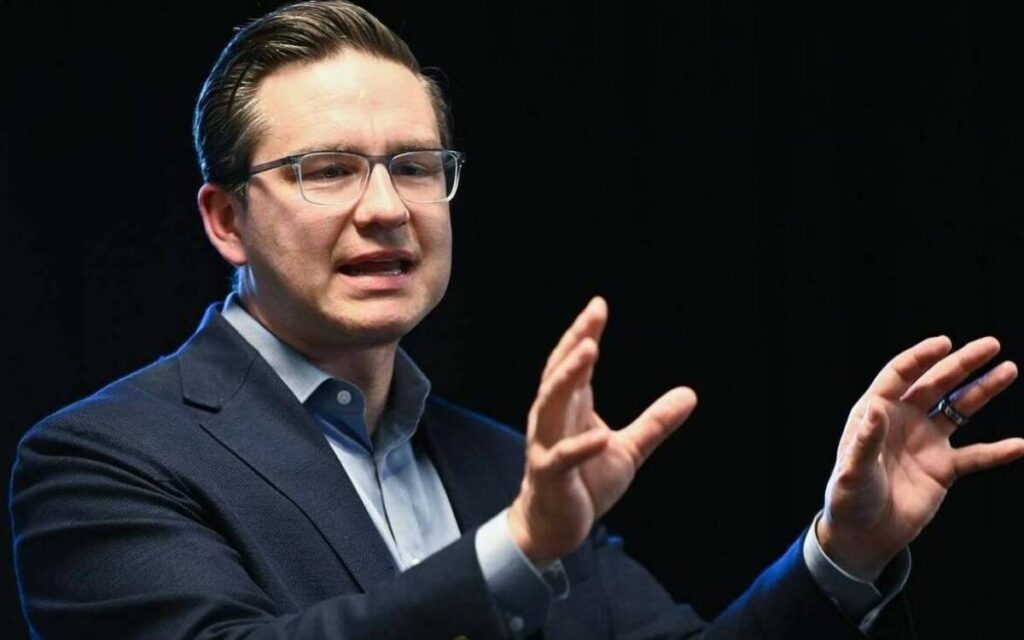
From the growing disparity between public vs. private sector compensation, to healthcare, to inflation, to the latest “woke” disturbance, right now everything in Canada certainly feels broken. Some politicians, like Pierre Poilievre (pictured), seem to register the resultant pessimism among Canadians. Whereas others don’t appear to notice, or care. Photo credit: The Canadian Press/Jacques Boissinot
Federal Conservative Leader Pierre Poilievre has said that Canada is broken. He has faced strong criticism from Prime Minister Justin Trudeau for saying so. Given recent events, Canadians could be forgiven for siding with Mr. Poilievre.
Last year’s fiascos included difficulty in obtaining a passport, successfully arriving at your destination by plane or train or finding your luggage when you got there.
There were stories about how millions of dollars, meant to help Canadians during the height of the pandemic, went to people who not only didn’t qualify, but some of whom were deceased.
The head of the Canada Revenue Agency then announced that it wasn’t worth their while to try and get any of the $15 billion in lost monies back. What a message to send to those who did play by the qualification rules.
To add insult to injury, federal bureaucrats don’t want to come back to their offices now that the pandemic is over. And then the federal workers’ union, the Public Service Alliance of Canada, gets the tone deaf of the year award by demanding a 47 per cent wage increase over three years.
This at a time when the Fraser Institute concludes that public sector wages, including Ontario and municipal employees were, on average, 34.4 per cent higher than for workers in the public sector.
Public sector workers retire 2.5 years earlier on average than their private sector colleagues, supported by defined benefit pension plans which most private sector workers can only dream about. Public sector workers are also over four times less likely to lose their jobs.
Perhaps someone should remind the union that their compensation is paid for by taxpayers who not only don’t have the same perks, they faced more job losses due to the pandemic and could face even more if the long-predicted recession hits the Canadian economy.
Then there are the continual horror stories of how our health care system is collapsing under the weight of an aging population, the impact of the pandemic and a burnt-out workforce. The verdict is out on whether the Premiers and the Prime Minister are capable of setting aside their political differences to come to a deal in the coming weeks that might actually help.
And don’t forget inflation, running at levels not seen in decades. Social media had a conniption when people started to post prices for everything from chicken breasts to lettuce. Grocery stores did not help their cause by posting healthy profits, nor when one chain announced it was freezing prices on its house brands – but only temporarily.
First house prices were too high for many middle-class families to afford a home and now, prices have fallen rapidly because of soaring interest rates, trapping many other families in overpriced real estate with increasing mortgages.
And every time you turn around, there is a new “woke” decision, undermining not only common sense, but the very pillars that the vast majority of Canadians support. For example, the City of Toronto is obsessed with changing the name of one of its main roads, Dundas Street, because they claim Henry Dundas, a Scottish MP and noted abolitionist was racist, forgetting the historical fact that he was one of the architects of the ban on slavery in Canada.
Another school is banning Valentine’s Day celebrations because the administration doesn’t feel it is inclusive enough and the National Arts Centre, funded by all taxpayers, is now holding a theatre production for “blacks only.”
Urban dwellers across the country, particularly in Toronto are afraid to take subway or bus because of increasing incidents of random violence while reports of dangerous repeat offenders let out on bail seem to be increasing dramatically.
One can argue that our social and legacy media always focus on bad news. And that can be very true. Good news items don’t attract as many “clicks” by readers, to use the technical buzz word.
Andrew Coyne, a Globe and Mail columnist, recently observed that it wasn’t Canada that was broken, it was government. And that is also a very applicable comment. Governments at all levels seem to have lost the ability to run things well anymore.
Or maybe it is simply the usual dour mood Canadians feel in the middle of winter that is fuelling so much pessimism in public opinion poll results.
Whatever the reason, politicians at all levels need to take note. Canadians don’t expect miracles, they get it that our problems are often complex and magic wands are in short supply. But their patience is wearing thin.
Our leaders need to show not only that they understand and that they can empathize, but that they really can make things better. The clock is ticking.

Janet Ecker is a former Ontario Finance Minister, Minister of Education, Minister of Community and Social Services and Government House Leader in the governments of Premier Mike Harris and Premier Ernie Eves. After her political career, she served as the founding CEO of the Toronto Financial Services Alliance, a public-private partnership dedicated to building Toronto region into an international financial centre. She currently sits on a number of corporate and non-profit boards, agencies and advisory committees.
Ms. Ecker received the Order of Canada for her public service contributions and was recognized as one of the “Most Influential People in the World’s Financial Centres” by Financial Centres International. She also received a “Canada’s Most Powerful Women: Top 100 Award” from the Women’s Executive Network and the Richard Ivey School of Business, among other awards. She is also one of the founders of Equal Voice, a national, multi-partisan organization working to elect more women.




















